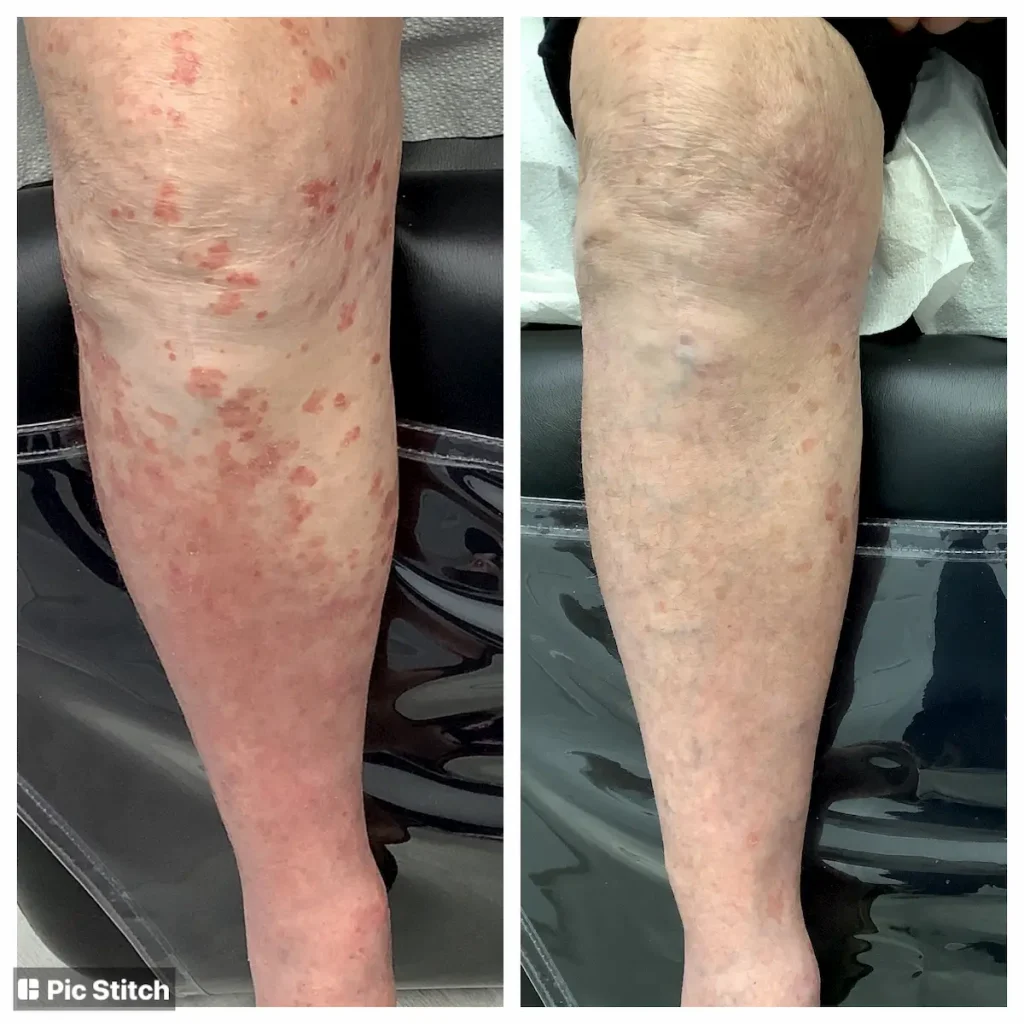Psoriasis
Psoriasis is a chronic skin condition that affects millions of Americans, causing red, scaly patches that may itch, burn, or crack.

Care for Chronic Skin Conditions
Psoriasis is a chronic skin condition that affects millions of Americans, causing red, scaly patches that may itch, burn, or crack. While not contagious, psoriasis is often misunderstood and can significantly impact quality of life.
What Is Psoriasis?
Psoriasis is an autoimmune disorder where the immune system triggers the skin to produce new cells too quickly. Instead of shedding naturally, these excess cells build up on the surface, leading to thickened, inflamed, and scaly plaques.
It is a chronic condition, meaning it can last a lifetime, but with the right treatment plan, symptoms can be effectively managed.
Common Types of Psoriasis
Psoriasis can appear in different forms, and patients may experience more than one type during their lifetime.
- Plaque Psoriasis (Psoriasis Vulgaris): The most common form; raised, red patches covered with silvery-white scales.
- Guttate Psoriasis: Small, drop-shaped lesions often triggered by infections like strep throat.
- Inverse Psoriasis: Smooth, shiny lesions that appear in skin folds (under breasts, groin, armpits).
- Pustular Psoriasis: White pustules (blisters filled with pus) surrounded by inflamed skin.
- Erythrodermic Psoriasis: A rare but severe form causing widespread redness, scaling, and itching that requires urgent care.
Symptoms of Psoriasis
Psoriasis can vary from mild to severe and may affect different areas of the body. Common symptoms include:
- Red patches of skin with thick scales
- Dry, cracked skin that may bleed
- Itching, burning, or soreness
- Stiff or swollen joints (psoriatic arthritis)
- Nail changes, including pitting, discoloration, or separation from the nail bed
What Causes Psoriasis?
While the exact cause isn’t fully understood, psoriasis is linked to an overactive immune system and genetics. Flare-ups may be triggered by:
- Stress
- Cold, dry weather
- Infections (strep throat, bronchitis, etc.)
- Certain medications (beta-blockers, lithium)
- Alcohol or smoking
- Skin injuries (cuts, sunburns, or scratches – known as the Koebner phenomenon)
Is Psoriasis Dangerous?
Psoriasis itself is not life-threatening, but it can be associated with other health conditions, including:
- Psoriatic arthritis (joint pain and stiffness)
- Cardiovascular disease
- Depression and anxiety
- Obesity and diabetes
Because psoriasis is more than a skin condition, ongoing dermatologic care is essential.
Living With Psoriasis: Patient Tips
While medical treatment is essential, lifestyle changes can also reduce psoriasis flare-ups:
- Apply fragrance-free moisturizers daily
- Take short, lukewarm baths with added bath oils
- Manage stress through yoga, meditation, or exercise
- Avoid smoking and limit alcohol
- Maintain a healthy weight and balanced diet
Why Choose St. Louis Dermatology & Cosmetic Surgery for Psoriasis Care?
At SLD in Troy, Missouri, we combine expert medical care with advanced treatment options to help patients manage psoriasis and improve their quality of life.
Our Advantages:
- Board-certified dermatologists with expertise in autoimmune skin conditions
- Access to cutting-edge biologic therapies
- Comprehensive care for both skin and joint symptoms
We understand that psoriasis affects more than your skin — it impacts your confidence, daily comfort, and emotional well-being. Our team is here to provide compassionate, effective care tailored to your needs.
Schedule A Consultation Today
If you’re struggling with persistent skin patches, itching, or joint pain, don’t wait. Early diagnosis and treatment of psoriasis can help prevent complications and give you long-term relief.
📞 Call St. Louis Dermatology & Cosmetic Surgery today or book online to schedule a consultation.
GET IN TOUCH
